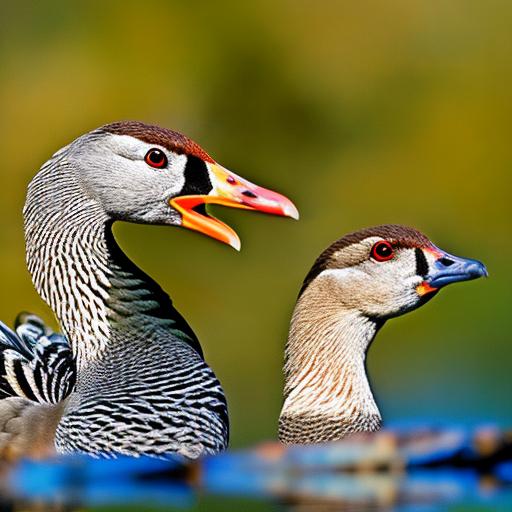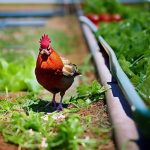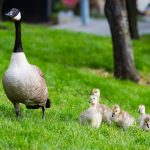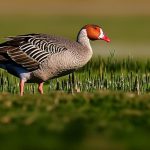Geese are a common sight in many neighborhoods, parks, and open spaces. These large waterfowl are known for their distinctive honking sound and their graceful flight patterns. While geese can be a beautiful addition to the natural landscape, they can also become a nuisance when they invade your yard. Understanding geese behavior and knowing how to keep them away can help you maintain a peaceful and clean outdoor space.
Geese are attracted to yards for several reasons. One of the main reasons is the availability of food. Geese are herbivores and feed on grass, plants, and grains. If your yard has lush green grass or a vegetable garden, it can be an inviting buffet for these birds. Additionally, geese are attracted to bodies of water such as ponds or lakes, so if you have a water feature in your yard, it may be more likely to attract geese.
Key Takeaways
- Geese can be a common sight in yards and parks, but they can also cause damage and health hazards.
- Reasons to keep geese out of your yard include their droppings, aggressive behavior, and potential for spreading diseases.
- Understanding geese behavior can help you identify signs of infestation, such as nesting or feeding patterns.
- Effective ways to keep geese away include natural deterrents like landscaping and physical barriers like fencing or netting.
- Professional geese control services can provide more advanced methods like hazing or relocation.
Reasons to Keep Geese Out of Your Yard
While geese may seem harmless, there are several reasons why you may want to keep them out of your yard. One of the main reasons is the damage they can cause to your property and landscaping. Geese have a voracious appetite and can quickly strip your lawn of grass or damage plants and flowers in your garden. Their constant grazing can leave unsightly patches of bare ground and make it difficult for other plants to thrive.
Another reason to keep geese out of your yard is the health risks associated with their droppings. Goose droppings can carry bacteria such as E.coli and Salmonella, which can pose a risk to humans and pets if ingested or if they come into contact with contaminated surfaces. Additionally, goose droppings can create an unpleasant odor and make it difficult to enjoy your outdoor space.
Geese can also be noisy and disruptive. Their honking can be loud and constant, especially during mating season or when they feel threatened. This noise pollution can be a nuisance to you and your neighbors, especially if you live in close proximity to other houses.
Understanding Geese Behavior
To effectively keep geese out of your yard, it is important to understand their behavior and habits. Geese are monogamous and mate for life. They typically begin nesting in the spring and can lay up to 12 eggs per clutch. During this time, geese can become more aggressive and territorial as they protect their nests and young.
Geese are also grazers and feed on grass, plants, and grains. They have a keen sense of sight and can spot potential food sources from a distance. This is why they are often attracted to well-maintained lawns and gardens.
Geese are also territorial animals and will defend their nesting sites and feeding areas from perceived threats. They may hiss, flap their wings, or charge at intruders to protect their territory. Understanding these behaviors can help you develop effective strategies for keeping geese away from your yard.
Identifying Signs of Geese Infestation
If you suspect that geese have taken up residence in your yard, there are several signs to look out for. One of the most obvious signs is the presence of goose droppings on your lawn and walkways. Goose droppings are large and can be greenish-brown or white in color. They may also have a strong odor.
Another sign of geese infestation is damage to plants and landscaping. Geese will graze on grass, leaving behind patches of bare ground. They may also trample plants or pull them out of the ground while feeding. If you notice damage to your lawn or garden, it may be a sign that geese have been visiting your yard.
Frequent sightings of geese on your property can also indicate an infestation. If you regularly see geese in your yard or hear their honking, it is likely that they have made your property their home.
Effective Ways to Keep Geese Away
There are several effective ways to keep geese away from your yard. One method is to use loud noises and visual deterrents. Geese are sensitive to loud noises and may be scared away by the sound of a horn, clapping, or banging pots and pans together. Visual deterrents such as scarecrows, reflective tape, or balloons can also be effective in deterring geese.
Water deterrents can also be effective in keeping geese away. Geese are reluctant to land or swim in water that is constantly moving or has a strong current. Installing a water feature such as a fountain or a sprinkler system can help deter geese from your yard.
Motion-activated sprinklers can also be an effective way to keep geese away. These sprinklers are triggered by motion and will spray water when geese approach, scaring them away.
Natural Deterrents for Geese

If you prefer to use natural methods to deter geese, there are several options available. Planting certain types of vegetation can make your yard less attractive to geese. Geese prefer short grass, so allowing your lawn to grow longer can discourage them from grazing. Planting tall grasses or shrubs around the perimeter of your yard can also create a barrier that geese are less likely to cross.
Using natural predators like dogs or hawks can also help deter geese. The presence of a dog or a hawk can make geese feel threatened and encourage them to find another place to feed or nest.
Applying repellents made from natural ingredients can also be effective in keeping geese away. These repellents typically contain ingredients such as garlic oil or capsaicin, which create an unpleasant taste or smell for geese. Applying these repellents to areas where geese are likely to feed or nest can help deter them from your yard.
Physical Barriers for Geese Control
Physical barriers can be an effective way to keep geese out of your yard. Fencing and netting can be used to create a barrier that geese are unable to cross. Fencing should be at least three feet high and have small openings to prevent geese from squeezing through. Netting can be used to cover ponds or other bodies of water to prevent geese from landing or swimming.
Spikes and other physical barriers can also be effective in keeping geese away. Spikes can be installed on ledges or other surfaces where geese may try to land. These spikes make it uncomfortable for geese to perch or walk on, discouraging them from staying in your yard.
Electric fencing is another option for geese control. Electric fencing delivers a mild electric shock when touched, which can deter geese from entering your yard. However, it is important to use caution when installing electric fencing and follow all safety guidelines.
Professional Geese Control Services
If you are unable to effectively control a geese infestation on your own, it may be necessary to seek professional help. Professional geese control services specialize in removing and deterring geese from residential and commercial properties. These professionals have the knowledge and experience to effectively handle geese infestations and can provide long-term solutions for keeping geese away.
Hiring a professional geese control service has several benefits. These professionals have access to specialized equipment and techniques that may not be available to the average homeowner. They also have a deep understanding of geese behavior and can develop customized strategies for deterring geese from your property.
Preventing Geese Infestation in the Future
Once you have successfully removed or deterred geese from your yard, it is important to take steps to prevent future infestations. Regular maintenance of your property is key to preventing geese from returning. This includes keeping your lawn well-maintained, removing fallen leaves and debris, and regularly cleaning up any spilled birdseed or other food sources.
Removing food sources is also important in preventing geese infestations. This includes removing any bird feeders or other sources of food that may attract geese. It is also important to secure garbage cans and compost bins to prevent geese from accessing these food sources.
Planting vegetation that geese don’t like can also help prevent future infestations. Geese prefer short grass and open spaces, so planting tall grasses, shrubs, or trees can make your yard less attractive to them. Additionally, planting vegetation that geese find unpalatable, such as prickly bushes or plants with strong odors, can help deter them from your yard.
Conclusion and Final Thoughts on Geese Control
Geese can be a beautiful addition to the natural landscape, but they can also become a nuisance when they invade your yard. Understanding geese behavior and knowing how to keep them away can help you maintain a peaceful and clean outdoor space. By implementing effective deterrents, using natural methods, or seeking professional help if needed, you can successfully keep geese out of your yard. Taking action to prevent geese infestations is important for the health and enjoyment of your outdoor space.
If you’re looking for effective ways to keep geese out of your yard, you might find this article on poultrywizard.com helpful. It provides valuable insights on how to convert a shed into a chicken coop, which can serve as a deterrent for geese. By creating a secure and enclosed space for your chickens, you can minimize the chances of geese invading your yard. Check out the article here: https://poultrywizard.com/keeping-chickens/convert-shed-to-chicken-coop/.
FAQs
What are some effective ways to keep geese out of my yard?
There are several effective ways to keep geese out of your yard, including installing physical barriers such as fences or netting, using decoys or scare tactics, and modifying the landscape to make it less attractive to geese.
Why do geese come into my yard?
Geese are attracted to yards and other open spaces because they provide easy access to food, water, and shelter. They may also be attracted to areas with large bodies of water nearby.
Are geese dangerous?
While geese are generally not aggressive towards humans, they can become territorial and defensive if they feel threatened or if their young are nearby. They may hiss, flap their wings, or charge at perceived threats.
What are some common problems associated with geese in yards?
Some common problems associated with geese in yards include damage to landscaping and gardens, fouling of sidewalks and other surfaces with droppings, and noise pollution from honking and other vocalizations.
Are there any legal restrictions on removing geese from my yard?
In many areas, geese are protected by law and it may be illegal to harm or remove them without a permit. It is important to check local regulations before taking any action to remove geese from your yard.
Meet Walter, the feathered-friend fanatic of Florida! Nestled in the sunshine state, Walter struts through life with his feathered companions, clucking his way to happiness. With a coop that’s fancier than a five-star hotel, he’s the Don Juan of the chicken world. When he’s not teaching his hens to do the cha-cha, you’ll find him in a heated debate with his prized rooster, Sir Clucks-a-Lot. Walter’s poultry passion is no yolk; he’s the sunny-side-up guy you never knew you needed in your flock of friends!







